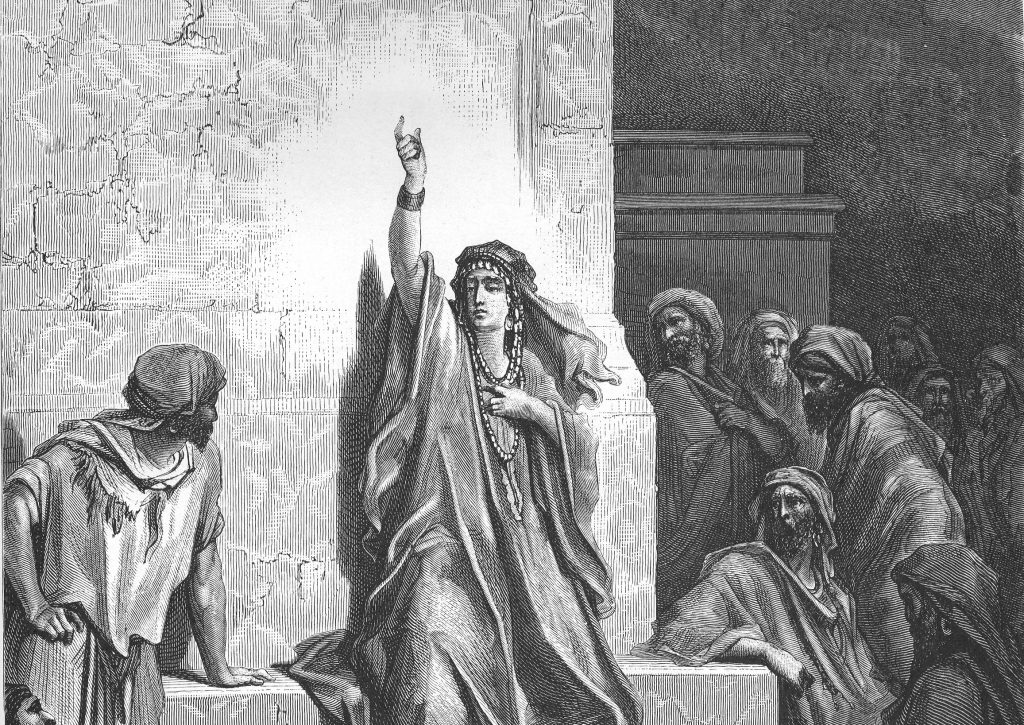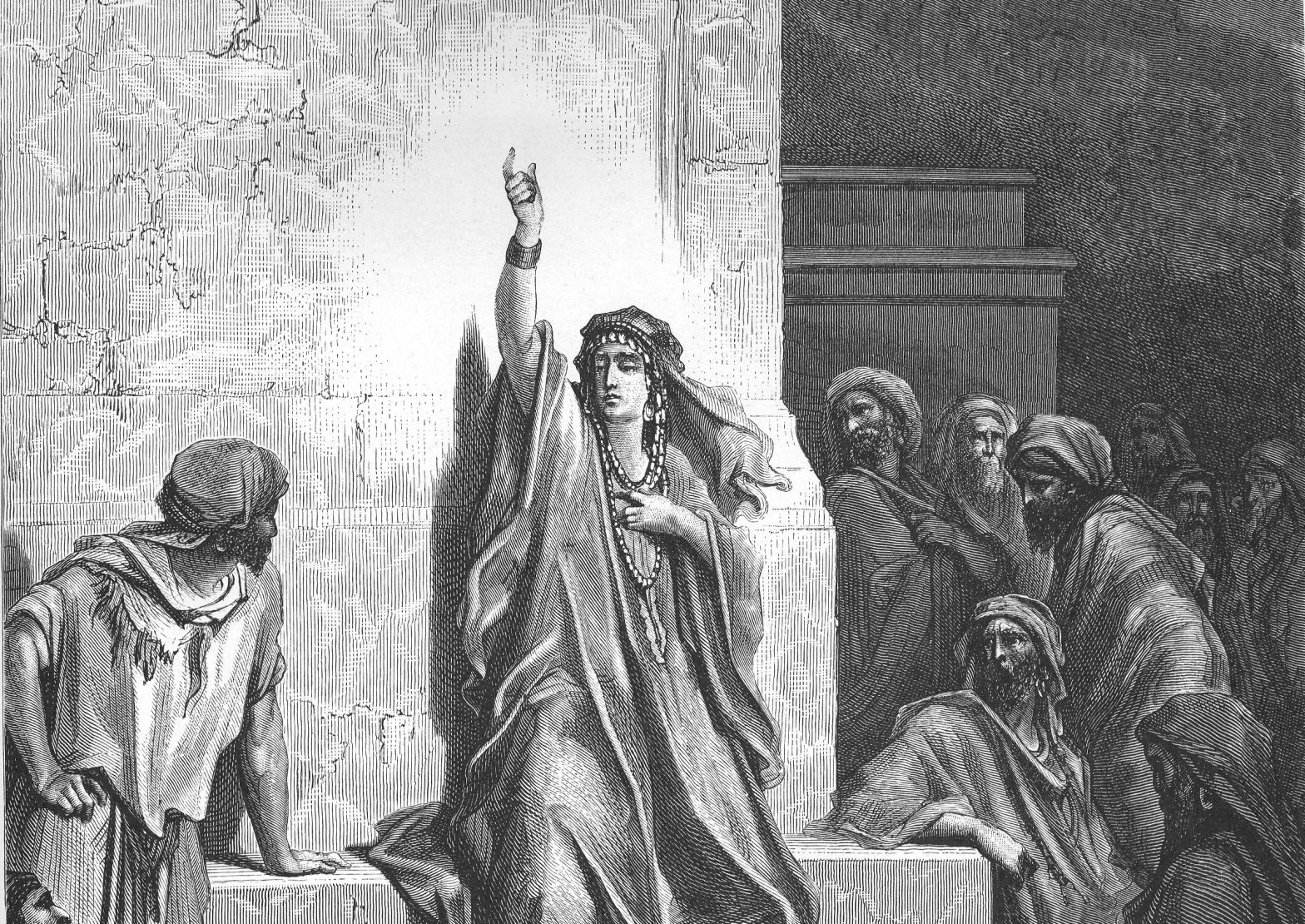
According to the Book of Judges, Deborah (Hebrew: דְּבוֹרָה, Dəḇōrā, “bee”) was a prophetess of the God, the fourth Judge of Israel and the only female judge mentioned in the Bible. She is well-known as she inspired Barak to defeat Sisera.
Judges 5 The Song of Deborah, is one of the oldest in the Bible, and perhaps the earliest sample of Hebrew poetry.
Mentions in the Bible
- The prophetess, a judge of Israel
Judges 4:4,5; 5:7- Inspires Barak to defeat Sisera
Judges 4:6-16 - The triumphant song of
Judges 5 [2]
- Inspires Barak to defeat Sisera
Meaning of Deborah’s Name
Her name means “bee”, a honey bee to her friends, a stinging bee to the enemy (Cornelius a Lapide). She answered her name by her industry, sagacity, and great usefulness to the public, her sweetness to her friends and sharpness to her enemies. [1]
Wife of Lapidoth
She is said to be the wife of Lapidoth (Judges 4:4); but, the termination not being commonly found in the name of a man, some make this the name of a place: she was a woman of Lapidoth. Others take it appellatively, Lapidoth signifies lamps. The Rabbin say she had employed herself in making wicks for the lamps of the tabernacle; and, having stooped to that mean office for God, she was afterwards thus preferred. Or she was a woman of illuminations, or of splendours, one that was extraordinarily knowing and wise, and so came to be very eminent and illustrious.
A Prophet and A Judge
She lived under the palm tree of Deborah between Ramah and Bethel in Mount Ephraim, Judges 4:5, which, as palm trees were rare in Palestine, “is mentioned as a well-known and solitary landmark”, possibly meaning Baal Tamar (Judges 20:33). She was probably a woman of Ephraim.
Concerning her we are here told,
1. That she was intimately acquainted with God; she was a prophetess, one that was instructed in divine knowledge by the immediate inspiration of the Spirit of God, and had gifts of wisdom, to which she attained not in an ordinary way: she heard the words of God, and probably saw the visions of the Almighty.
2. That she was entirely devoted to the service of Israel. She judged Israel at the time that Jabin oppressed them; and perhaps, being a woman, she was the more easily permitted by the oppressor to do it. She judged, not as a princess, by an civil authority conferred upon her, but as a prophetess, and as God’s mouth to them, correcting abuses and redressing grievances, especially those which related to the worship of God.
It is said she dwelt, or, as some read it, she sat under a palm-tree, called ever after from her the palm-tree of Deborah. Either she had her house under that tree, a mean habitation which would couch under a tree, or she had her judgment-seat in the open air, under the shadow of that tree, which was an emblem of the justice she sat there to administer, which will thrive and grow against opposition, as palms under pressures.
Inspires Barak to defeat Sisera
The people of Israel had been oppressed by Jabin, the king of Canaan, whose capital was Hazor, for twenty years. Stirred by the wretched condition of Israel she sends a message to Barak, the son of Abinoam, at Kedesh of Naphtali, and tells him that the Lord God had commanded him to muster ten thousand troops of Naphtali and Zebulun and concentrate them upon Mount Tabor, the mountain at the northern angle of the great plain of Esdraelon.
At the same time she states that the Lord God of Israel will draw Sisera, commander of Jabin’s army, to the River Kishon. Barak declines to go without the prophet. Deborah consents, but declares that the glory of the victory will therefore belong to a woman. As soon as the news of the rebellion reaches Sisera, he collects nine hundred chariots of iron and a host of people.
Then Deborah said, according to Judges 4:14:
“Go! This is the day the Lord has given Sisera into your hands. Has not the Lord gone ahead of you?” So Barak went down Mount Tabor, with ten thousand men following him.
As Deborah prophesied, a battle is fought (led by Barak), and Sisera is completely defeated. He escapes on foot while his army is pursued as far as Harosheth Haggoyim and destroyed. Sisera comes to the tent of Jael and lies down to rest. He asks for a drink, she gives him milk and while he is asleep she hammers a tent-pin through his temple.
The Biblical account of Deborah ends with the statement that after the battle, there was peace in the land for 40 years (Judges 5:31).
The Song of Deborah
Deborah’s Song ( Judges 5:2-31 ) is one of the most ancient and magnificent remains of early Hebrew literature. It is a song of victory, sung in memory of Israel’s triumph (under the leadership of Deborah and Barak) over Sisera and the kings of Canaan. The vivid pictures which the poem brings up before the mind’s eye make it certain that the writer (whether Deborah or another) lived at the time of the events described. The parallel, and somewhat later, account (in prose) of the same battle ( Judges 4:4-24 ) agrees in the main with the poem, though there are many differences in the details. The Song is divided into four distinct sections:
- Praise to God, and the terror of His approach, Judges 4:2-5.
- Condition of Israel prior to Deborah’s activity, Judges 4:6-11.
- Gathering of the tribes of Israel, Judges 4:12-18.
- Victory of Israel and death of Sisera, Judges 4:19-23.
The chief importance of the Song lies in the historical data it contains, and in the light it throws on some of early Israel’s conceptions of God.
Of the former, the main points are that at this time the Israelites had securely settled themselves in the mountainous districts, but had not as yet obtained any hold on the fertile lands of the Plain; that unity had not yet been established among the tribes of Israel; and that the ‘twelve tribes’ of later times had not yet all come into existence.
Of the latter, the main points are: that God has a dwelling-place on the mountains in the South; that, therefore, He has not yet come to dwell among His people, though He is regarded as specifically the God of Israel; that He comes forth from His dwelling-place to lead His people to battle; and that His might and strength are so great that the very elements are shaken at His approach.
Traditional chronology
Traditional Jewish chronology places Deborah’s 40 years of judging Israel (Judges 5:31) from 1107 BC until her death in 1067 BC. The Dictionary of World Biography: The Ancient World claims that she might have lived in the period between 1200 BC to 1124 BC. Based on archaeological findings, different biblical scholars have argued that Deborah’s war with Sisera best fits the context of either the second half of the 12th century BC or the second half of the 11th century BC.
Reference
Deborah from Hastings’ Dictionary of the Bible
